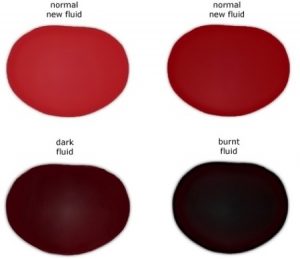Do I Really Need a Transmission Flush?
Posted July 16, 2014
We’ve had many conversations with our customers here in White Bear Lake, MN – any time we recommend a transmission flush, our customers ask questions. So what is a transmission flush? Can’t you just top off the fluid? Is it really necessary?
We understand your confusion – a transmission flush isn’t one of the aspects of preventative maintenance that usually come to mind. An oil change, new tires, wiper blades… but a transmission flush? Just like an oil change, your transmission needs regular maintenance to keep your car running smoothly.

This image compares the color of new transmission fluid to burnt fluid. Fluid should be a clean red color; dark and black color indicates you need to change the fluid.
What is a flush?
A transmission flush usually involves connecting your transmission to a professional grade machine to completely flush the transmission fluid out of your vehicle. Running solution through the lines until they come out clean, it then fills your system with new fluid.
A transmission fluid change, on the other hand, simply drains the fluid with gravity. A change usually does not drain all of the fluid, but does allow you to replace most of the old with fresh transmission fluid. Both services are helpful and can extend the life of your transmission.
Some signs your car needs transmission service:
Carsdirect.com offers these warning signs that you may need a transmission flush – “There may be times when you need to get a transmission flush, in order to help protect your car’s transmission:
- Transmission Grinding or Strange Noises … If you notice your transmission grinding or making strange sounds, you should stop the vehicle and check the transmission fluid level while the engine is still running. Insure that the transmission fluid color is bright red and not brown or black because of grime or sludge. If the fluid level of the transmission is acceptable, your vehicle probably needs a transmission flush.
- Problems Shifting Gears … A transmission that contains too much dirt or sludge will cause sluggish response in the transmission which will result in your vehicle changing gears too quickly or too late while driving. In manual transmission vehicles, you may find it very hard to change gears at all.
- Slipping Gears … A dirty transmission may cause a lack of hydraulic power, much the same as not having enough transmission fluid will cause. In order to stay in the appropriate gear, the transmission must develop enough pressure.
- Surging of the Vehicle … This is caused by inconsistent flow of clean transmission fluid that is needed to ensure smooth operation of the gears and other moving parts inside the transmission bell housing.
- Delay in Vehicle Movement … Another sign that your vehicle may have contaminated transmission fluid is when the vehicle stalls for one or two seconds before moving after having been put in gear. If there are no other problems with the transmission, a transmission flush may help.”
You should be aware that if the vehicle is displaying these symptoms, your dirty transmission may have already caused bigger problems. Read more from Cars Direct here. If your car is displaying any of these symptoms or having other transmission issues, stop by our shop for an inspection.
Is it really necessary?
Ultimately it is best to consult your manufacturer owner’s manual and follow the recommended services and guidelines provided. Many manufacturers recommend a transmission flush every 30,000 miles or 2 years. However, not all recommend this frequently – some suggest a flush only every 100,000 miles, and others don’t recommend a transmission flush at all. Sometimes, if your car is having trouble, you may need a transmission service between the recommended intervals.
A transmission flush can extend the life of your transmission. Like all preventative maintenance, the cost and time of this process can save you from expensive transmission repairs down the road. Our technicians keep track of the manufacturer recommendations for your vehicle and can help you make an informed decision for your family. If you have questions about your vehicle’s transmission, or other concerns, please call us at 651-426-0462.
